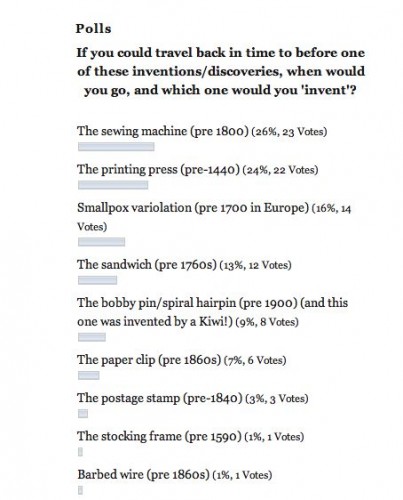Last week’s poll was about inventions:
I found the answers intriguing. On the one hand, this is a sewing-focused blog, so it’s not surprising that the largest amount of you voted for the Sewing Machine as the item you would ‘invent’ if sent back in time to before it existed. On the other hand, at least to my mind, with the possible exception of the stocking frame, the sewing machine would be the most difficult of these to recreate and invent.
I’d have no problem making a paper clip, barbed wire or a spiral hairpin with some pretty basic materials, the postage stamp is a easy idea to recreate, the sandwich is a slam-dunk, I know how a printing press works well enough that I could explain it to a medieval craftsman, and variolation is a scarily easy concept.

Mary Wortley Montagu who helped to bring smallpox variolation to the West, by Charles Jervas, after 1716
But the sewing machine?
I may work with it every day, I can take one apart to some degree and put it back together and make it work, but I still couldn’t really explain to an engineer what would be needed to recreate a working one.
There is an interesting discussion of how useful a modern person would be in a historical situation. Of course, the answer depends hugely on the person, and the period.
I think I’d be reasonably useful all the way back to prehistory: growing up on a farm gave me a decent background in a lot of really practical, hands-on skills, from plumbing (I can start a basic gravity intake and transport the water for miles), to carpentry, to medicine of the scientifically-proven herbal variety, to cooking in cast iron over fires, to (of course) agriculture. My trump card would be sewing: hand-sewing goes back millennia and as far as we can tell has been valued for all that time.
But I couldn’t tell an inventor in 1790 how to make a working sewing machine.
So, if you voted for sewing machine, could you actually work with an engineer/mechanic and make one? And what about the other stuff? Do you understand variolation? Could you make barbed wire quickly and easily without tearing yourself to shreds? Or would your skill just be awesome sandwiches?


I voted for postage stamp for these exact reasons: I doubt I would be able to explain or make the others. Not even the bobby pin!
Sandwich just did not seem like such a huge deal to me at the time; but now that I think about it, if I went back in time, I’d probably inadvertently invent sandwich (or the Czech bread variant thereof)simply because I’m so used to it.
Fantastic outfit on the lady.
I think I voted for the bobby pin… partly because I love that period in history! But I think I’d be pretty well able to at least explain how to make one (metal working is not my forte, but I can do a decent drawing.) Bobby pins are pretty indispensable to me…
I might be able to explain a printing press, and things like sandwiches and postage stamps are simple enough in concept. But I certainly couldn’t build a sewing machine! And I wouldn’t have a clue how to explain variolation (nor do I know what a stocking frame is.)
I voted for the sandwich–something I could be *sure* to accomplish!
well problem was it was 2 questions in one.
I’d like to be around before the invention of the sewing machine, because I’m a hand sewer and thing those machines are out to get me.
But I don’t want to invent it…or any in the list.
yes, being a woman, a sandwich is supposed to be right up my alley, right? 😉 so I voted for that. haha.
this is a brilliant PBS series that you should watch – i watched it many years ago. he talked about the invention of the sewing machine in one episode, and what was necessary for the idea to come to fruition:
http://topdocumentaryfilms.com/james-burke-connections/
sorry, i could not ferret out the exact episode.
I could explain but not make almost everything except the sewing machine and the stocking frame. One problem is that I am unsure how to make wire. Just how do you draw out hot metal to a wire of even diameter? Must Google it. After you have the wire, several of them are a matter of a pair of pliers and holding your face right.
My childhood on the farm gave me a range of skills similar to yours, not mechanical, unfortunately. This wasn’t then considered suitable work for a girl. Nor was gutting hens etc, which I was not sorry about!
That is SO cool, that you grew up on a farm and know those skills. My dog is best friends with a dog owned by an old cowboy. I love listening to his stories. They are a different world than mine, but I admit to be a wee jealous of his (and your) knowledge!
Huh. I never would have thought of it as “what could you explain,” just “which would you love to have the credit for inventing.” I was just wondering why I would want to be the inventor of the bobby pin. I definitely couldn’t explain how to make a sewing machine, and having been a city girl my whole life, I am in awe of your list of skills.
Given a decent machinist/engineer – they were good enough to make good accurate clockwork in the early 1700s so they did exist – I could probably explain enough of the concepts of a modern sewing machine to advance the art considerably.
“So you need two threads, right? One ends up on the top of the fabric, the other one stays on the bottom. The trick is to stick a loop of the top thread through the fabric and then get it around the reel that the bottom thread is on. Having the eye of the needle close to the tip seems to help.”
You’re not going to have a working sewing machine the next week, as there’s a bunch of timing and tension issues and techniques to work out – and I don’t know if 18thC thread was up to the task (P’raps the Dreamstress knows?), but I believe those are the essential technological concepts for sewing machine. Oh, and feed-dogs.
Barbed wire would be easier. That’s just a riff on rope-making techniques, with some pointy bits added.
The thing is that they had figured out the two thread concept in the 18th century, but it still took another 50 years to sort out the details enough to get a working machine. That’s why I don’t think I could explain it – despite knowing how they work, and knowing all the stages of non-working machines they went through.
I picked the stamp because I thought it was too unfair to have to pay for postage upon receipt. What if it was important news that you were too poor to pay to read? That an ugh–franking! Too tedious.
Hah! Very altruistic of you!
You mean that you never wondered what happened at the other end of a letter if it couldn’t be paid for?
That is why I picked the paper clip. I think I’m up enough on Victorian culture that I’d considered odd but not insane. You wouldn’t need to be able to make wire or even have the tools for it….just tottle down to the black smith with a nice little drawing.
This was a fscinating poll. I did read the question along the lines of the previous one about talents – and that I would take my current knowledge (and maybe a Hitchhiker’s Guide version of wikipedia)
So for me not really the ability to invent was important, but what I would consider the impact. The smallpox variolation to me stood out from the others and was surprised it did not get the most votes. It would have prevented many deaths, and blindness caused by this terrible disease. (As The Dreamstress pointed out: Once you get the concept of variolation it would have been mainly an issue to convince people to try it, which would have been challenging.)
The other inventions are on a different level. Once you understand the concept of the invention and can explain it, I believe craftsmen of the time would have been able to come up with a way to make it work. (Considering that proper materials were available. I did not know that using two threads would have been such a new thing, but that would be really difficult to come up with if you are hand-sewing.). Would a very expensive medieval sewing machine have caught on? If there was enough fabric to make more than one dress a year?
I am surprised that so many other commentators seem to put down their ability to ‘invent’ more complicated things – even if you don’t know exactly how you would put it together does not mean you could not come up with an idea!
I think the printing press would have been relatively easy to invent, the concept is basically the same as a rubber stamp, only bigger. As much as I love them I could not invent the sewing machine.
I think some of your dates are a little too early, the sewing machine was patented in 1846. And I think that I remember reading something about Marie Antoinette celebrating the invention of the smallpox vaccine with a “pouf au l’innoculation” or however you spell it.
I felt the same about the printing press.
Re: my dating. Though the first sewing machine wasn’t patented until 1846, people were working on the concept for 50 years before that, hence my dating.
Variolation and inoculation aren’t the same thing. Lady Mary Wortley Montagu brought smallpox variolation back from the Ottoman Empire in 1721. Other European travelers knew of it a few years earlier, but didn’t think to try it themselves. There were smallpox inoculations in the 1770s, but it wasn’t until the 1790s that Edward Jenner made the practice widely known. I went with variolation in the poll because it is a technique that almost any of us could do with a little training – vaccination requires more medical and scientific knowledge.
Wow, it sure takes a long time to invent things.
I went with smallpox variolation because even though I like to dabble in historical costuming, I am a biologist in real life. Also it seems like it probably directly saved the most lives, which is one reason I wanted to go into my field (even though it is somewhat unlikely I will discover something life-saving). Though the sandwich was a pretty brilliant invention, I think 🙂
I really liked this poll, by the way.
I don’t think I’d want to live in a world without sandwiches, so I think we can safely say that’s one invention I could definitely accomplish. IIRC, early sewing machines were chain stitch jobs with a hand crank or treadle, and I’m pretty sure I could figure that out given a bit of trial and error. I can remember spending a fascinating afternoon mucking about in the insides of a defunct model when I was a kid and I do have a vague recollection of where all the bits go.
The stocking frame, however, is way beyond me.